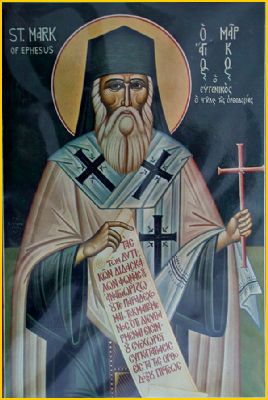|
|||
|---|---|---|---|
| This weekly bulletin insert complements the curriculum published by the Department of Christian Education of the Orthodox Church in America. This and many other Christian Education resources are available at http://dce.oca.org. | |||

In Mark 8: 30-34 we read one of the New Testament's starkest descriptions of the tribulations that Christ and His followers will face in this world. The words come directly from the Lord's lips. In the verse just before these, Peter has acknowledged Jesus as the Christ. Then Jesus, referring to Himself as "Son of Man" to emphasize His humanity, describes the suffering He must undergo; He will be rejected and killed before rising from the dead after three days. He rebukes Peter, who speaks out against this unexpected idea of a Messiah who will suffer rather than conquer Israel's enemies. Jesus expresses the rebuke in the simplest terms, referring to something children do when playing together--choosing sides. He makes it clear that every person is either on God's side or the side of men, meaning the side of those who cannot accept a Savior who suffers and submits. He tells not just His disciples but "the multitude" that each of them will have to "deny himself and take up his cross and follow me." We often think of these words as applying to the early Christian martyrs, but the Church also remembers a 15th-century Byzantine saint who denied himself and carried his heavy cross for many years. Saint Mark of Ephesus was firmly on God's side. In 1437 the faltering Byzantine Empire was threatened by the Muslim Turks, and the Emperor turned for help to the Roman Catholic West, which was more economically and politically stable. A council was convened in Florence, Italy. Many of the Greek Orthodox delegates, led by the Byzantine Emperor, were ready to acquiesce in whatever the West (represented by the Pope) asked, in exchange for aid in defending Byzantium. The Pope, seeing his advantage, offered help on condition that the Orthodox accept all Roman Catholic teachings, and be governed by Rome. Because of their dire situation, the Orthodox delegates were ready to agree, except for Mark of Ephesus. He saw that the Orthodox faith would be severely compromised, and refused to sign the agreement despite intense pressure and harassment from both sides. The Emperor was so angry that he put Mark under house arrest, where the exhausted man became severely ill. But nothing would keep him from defending the Orthodox faith unchanged and in its fullness.
Later, the agreement that had been signed at the Council of Florence was repudiated, and the Orthodox leaders at that time refused to abide by it. Mark, finally released and allowed to go home, was cheered for his steadfastness, though he still had to fight to preserve the faith against those who wanted to compromise. Saint Mark of Ephesus was not afraid of suffering for the sake of being on God's side. He once wrote, "If there had been no persecution, the martyrs would not have shone, nor would the confessors have received the crown of victory from Christ and by their exploits strengthened and gladdened the Orthodox Church." |
|||
